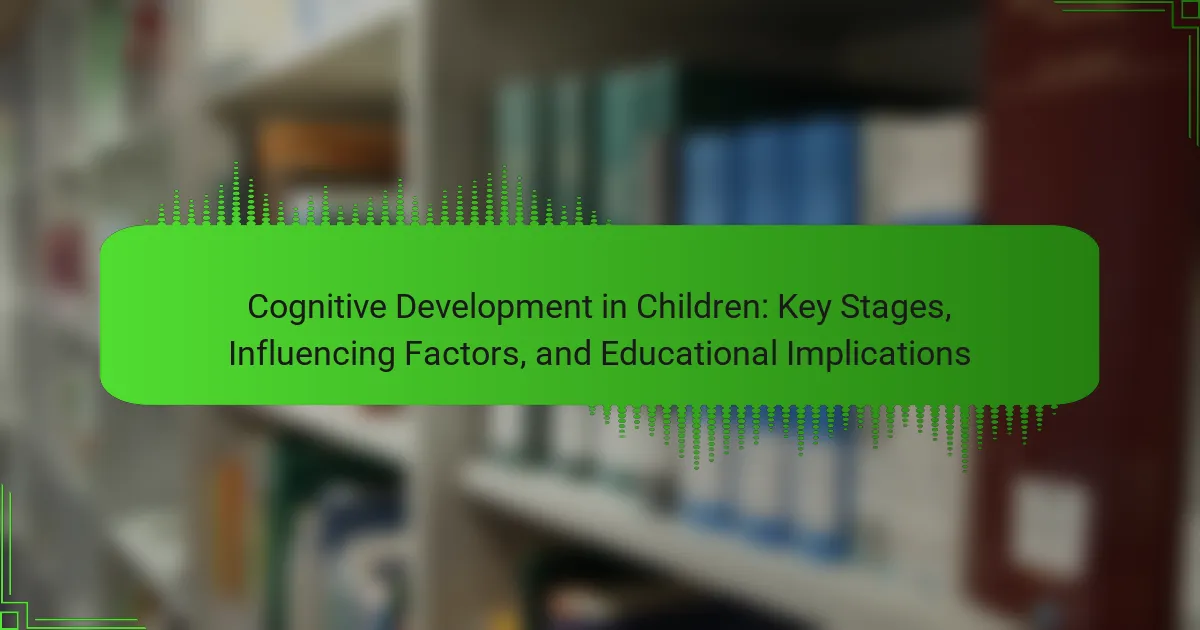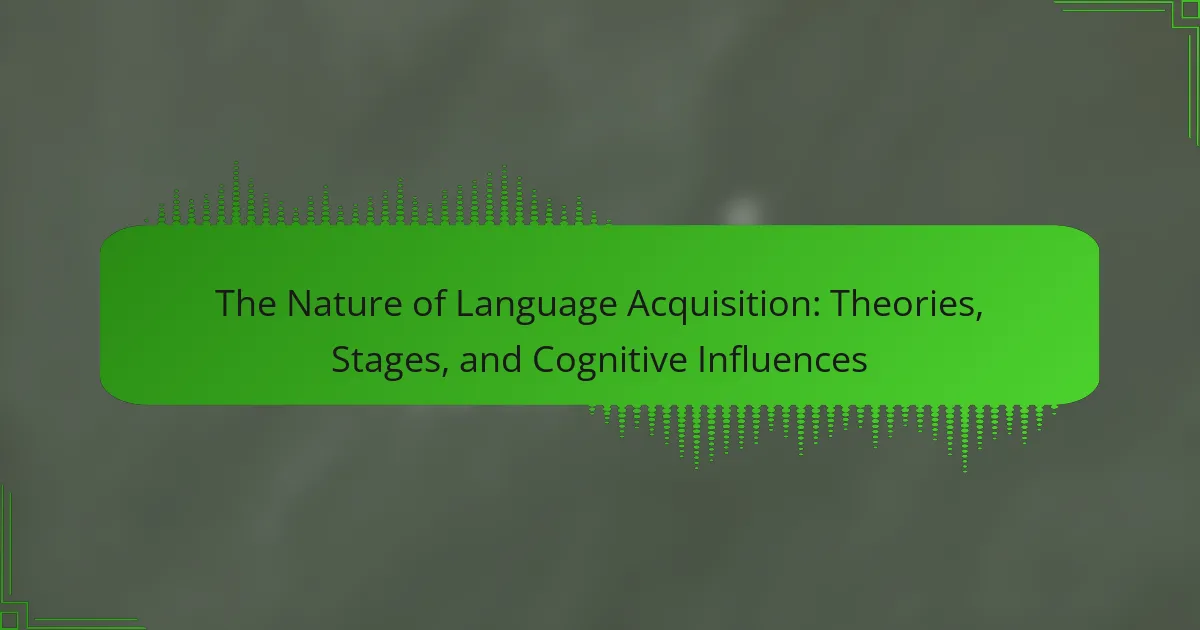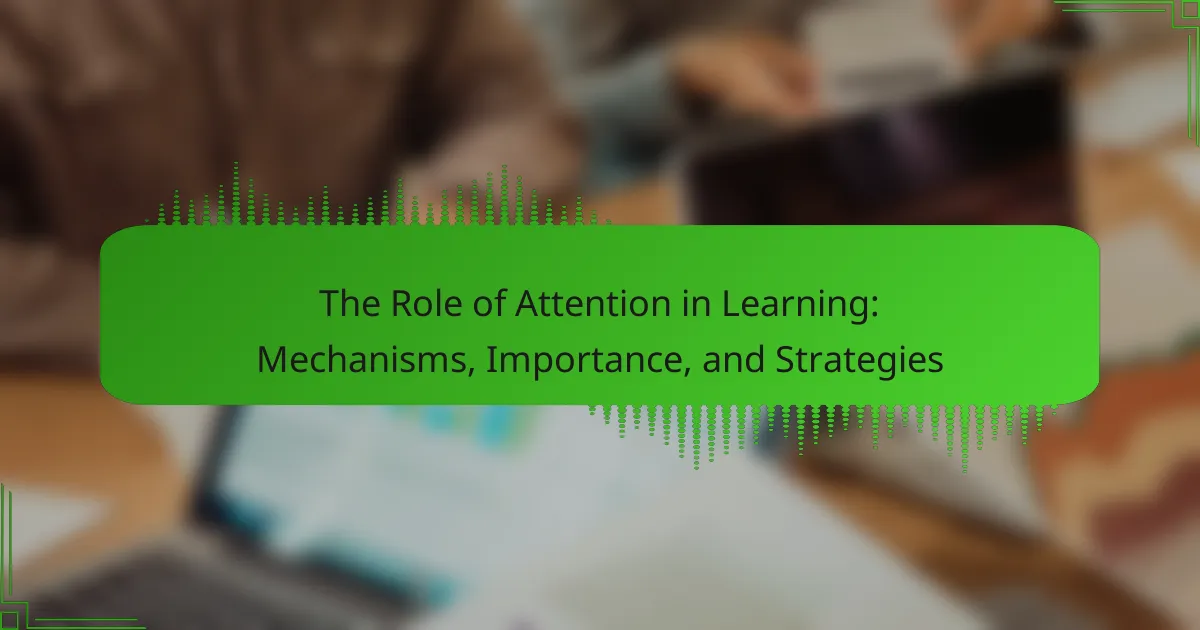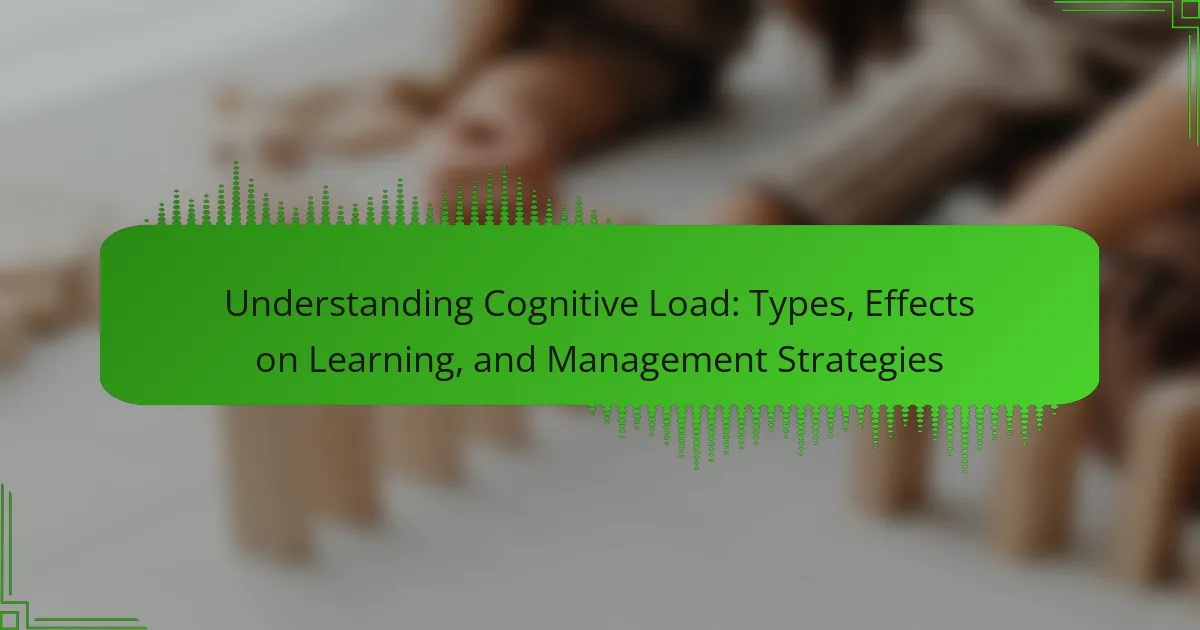Cognitive development in children encompasses the process through which children develop thinking, reasoning, and problem-solving skills, progressing through distinct stages identified by theorist Jean Piaget: sensorimotor, preoperational, concrete operational, and formal operational. Each stage presents unique cognitive abilities and limitations, influenced by genetic factors, environmental conditions, and social interactions. Research highlights the importance of stimulating environments and tailored educational strategies that align with children’s cognitive stages to enhance learning outcomes. Understanding these elements is crucial for educators to implement effective teaching methods that foster critical thinking and cognitive growth in children.
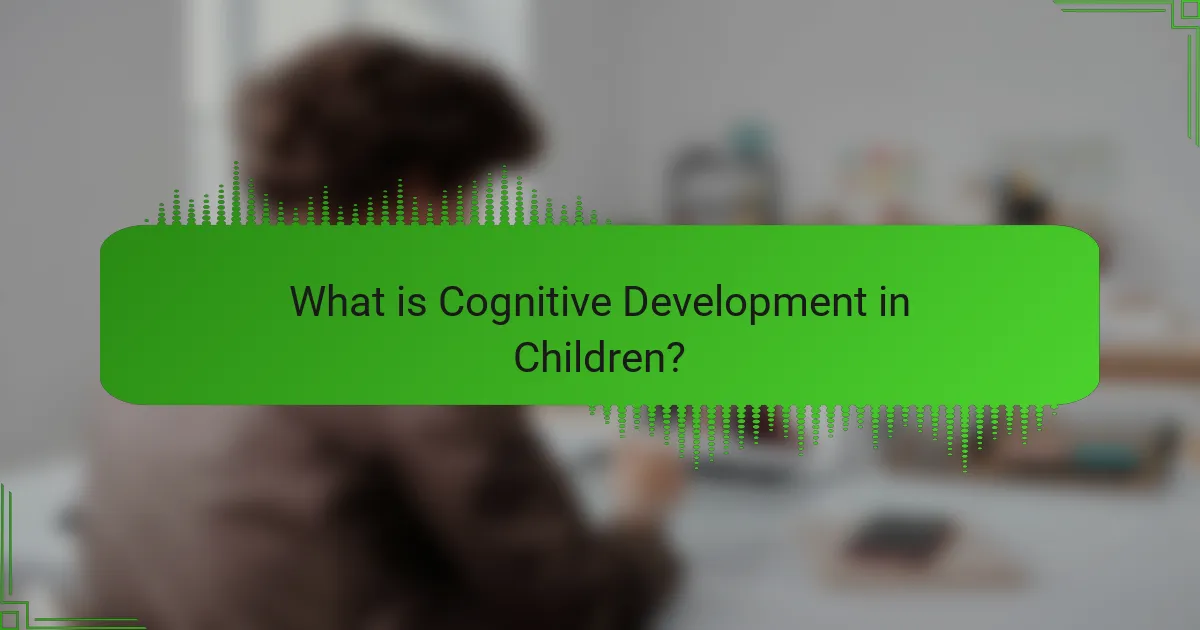
What is Cognitive Development in Children?
Cognitive development in children refers to the process by which children acquire thinking, reasoning, and problem-solving skills. This development occurs through various stages, as outlined by theorists like Jean Piaget. Piaget identified four key stages: sensorimotor, preoperational, concrete operational, and formal operational. Each stage is characterized by specific cognitive abilities and limitations. For example, during the sensorimotor stage, infants learn through sensory experiences and motor actions. In contrast, the formal operational stage allows adolescents to think abstractly and logically. Research indicates that cognitive development is influenced by factors such as genetics, environment, and education. Studies show that early childhood experiences significantly impact later cognitive abilities.
Why is understanding cognitive development important?
Understanding cognitive development is important because it influences how children learn, think, and interact with the world. Cognitive development shapes problem-solving skills, language acquisition, and social interactions. Research shows that early cognitive skills are linked to later academic success. For instance, the National Institute for Early Education Research indicates that children with strong cognitive skills in preschool perform better in later grades. Additionally, understanding cognitive development helps educators tailor their teaching strategies. It allows for the identification of children who may need additional support. This knowledge can lead to interventions that promote healthy cognitive growth. Overall, it is crucial for fostering effective learning environments.
What are the key theories of cognitive development?
The key theories of cognitive development include Piaget’s theory, Vygotsky’s sociocultural theory, and information processing theory. Piaget’s theory posits that children progress through four stages of cognitive development: sensorimotor, preoperational, concrete operational, and formal operational. Each stage represents a different way of thinking and understanding the world. Vygotsky’s theory emphasizes the role of social interaction and cultural context in cognitive development. He introduced concepts like the Zone of Proximal Development, highlighting the importance of guidance from more knowledgeable others. Information processing theory compares the human mind to a computer, focusing on how information is encoded, stored, and retrieved. This theory examines cognitive processes such as attention, memory, and problem-solving. These theories provide foundational frameworks for understanding how children’s thinking evolves over time.
How does cognitive development impact a child’s overall growth?
Cognitive development significantly impacts a child’s overall growth. It influences their ability to learn, problem-solve, and make decisions. Children with strong cognitive skills tend to perform better academically. Cognitive development also affects social skills and emotional regulation. Research indicates that early cognitive stimulation leads to better outcomes in later life. For example, children engaged in enriching activities show improved IQ scores and academic performance. Furthermore, cognitive growth supports language development, enhancing communication skills. Overall, cognitive development is crucial for holistic child growth and success.
What are the key stages of cognitive development in children?
The key stages of cognitive development in children are sensorimotor, preoperational, concrete operational, and formal operational. Jean Piaget identified these stages in his theory of cognitive development.
In the sensorimotor stage, which occurs from birth to about 2 years, children learn through their senses and actions. They develop object permanence, understanding that objects continue to exist even when out of sight.
The preoperational stage lasts from ages 2 to 7. During this period, children begin to use language and engage in symbolic play. However, their thinking is egocentric, meaning they have difficulty understanding perspectives other than their own.
The concrete operational stage occurs between ages 7 and 11. Children start to think logically about concrete events. They gain a better understanding of the concept of conservation, realizing that quantity does not change even when its shape does.
The formal operational stage begins at around age 12. In this stage, individuals develop the ability to think abstractly and reason logically. They can formulate hypotheses and consider possibilities beyond the immediate context.
These stages reflect a progression in cognitive abilities, supported by empirical research in developmental psychology.
What are the characteristics of the sensorimotor stage?
The sensorimotor stage is characterized by the development of motor skills and sensory experiences in infants. This stage occurs from birth to approximately two years of age. Infants learn about the world through their senses and actions. They explore objects by touching, grasping, and manipulating them. Object permanence develops during this stage, meaning infants understand that objects continue to exist even when out of sight. Infants also engage in goal-directed behavior, demonstrating intentional actions to achieve desired outcomes. The sensorimotor stage is crucial for laying the foundation for later cognitive development. Jean Piaget identified this stage as the first of four stages in his theory of cognitive development.
How does the preoperational stage differ from the concrete operational stage?
The preoperational stage differs from the concrete operational stage primarily in cognitive abilities. The preoperational stage, occurring from ages 2 to 7, is characterized by symbolic thinking and egocentrism. Children in this stage struggle with logical reasoning and have difficulty understanding others’ perspectives. In contrast, the concrete operational stage, occurring from ages 7 to 11, involves the development of logical thought. Children can perform operations on concrete objects but still struggle with abstract concepts. Research by Piaget indicates that children in the concrete operational stage can understand conservation and categorization, which are not fully grasped in the preoperational stage. Thus, the key difference lies in the ability to think logically and understand complex concepts.
What cognitive abilities emerge during the formal operational stage?
The formal operational stage, occurring from ages 12 and up, introduces advanced cognitive abilities. These abilities include abstract thinking, which allows individuals to understand concepts not directly tied to concrete objects. Logical reasoning emerges, enabling systematic problem-solving and hypothesis testing. Individuals can manipulate ideas in their mind, facilitating planning for the future. They develop metacognition, or awareness of their own thought processes. This stage also includes the ability to think about possibilities and engage in deductive reasoning. Research by Jean Piaget, who defined these stages, supports these findings. His studies indicate that children transition from concrete to abstract thinking during this developmental phase.
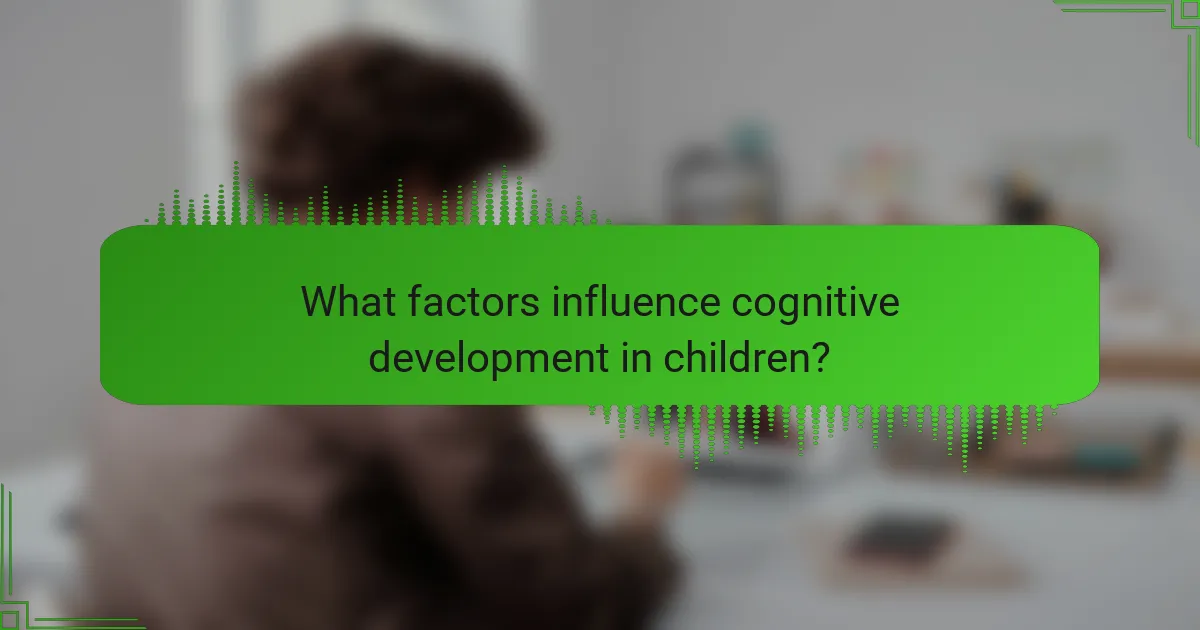
What factors influence cognitive development in children?
Genetic factors, environmental influences, and social interactions significantly influence cognitive development in children. Genetic factors provide foundational brain development and cognitive potential. Environmental influences include nutrition, exposure to toxins, and educational opportunities. Social interactions, such as communication with caregivers and peers, enhance cognitive skills. Research indicates that children with stimulating environments exhibit better cognitive outcomes. For example, studies show that enriched learning environments improve memory and problem-solving abilities. These factors collectively shape how children think, learn, and develop cognitively.
How do genetics play a role in cognitive development?
Genetics significantly influence cognitive development. Genetic factors contribute to the development of brain structures and functions. Studies show that heritability estimates for cognitive abilities range from 40% to 80%. Specific genes, like those involved in neurotransmitter regulation, affect learning and memory. Twin studies indicate that identical twins often show similar cognitive abilities, even when raised apart. Genetic predispositions can interact with environmental factors, further shaping cognitive outcomes. Overall, genetics provide a foundational framework for cognitive potential.
What are the environmental factors affecting cognitive growth?
Environmental factors affecting cognitive growth include nutrition, socioeconomic status, and exposure to toxins. Proper nutrition is essential for brain development. Studies show that deficiencies in key nutrients can impair cognitive function. Socioeconomic status influences access to educational resources and stimulating environments. Children from lower socioeconomic backgrounds often face challenges that can hinder cognitive growth. Exposure to environmental toxins, such as lead, negatively impacts cognitive abilities. Research indicates that higher levels of lead exposure correlate with lower IQ scores. Additionally, the quality of early childhood education significantly affects cognitive outcomes. Engaging and supportive learning environments promote better cognitive development.
How does socioeconomic status impact cognitive development?
Socioeconomic status significantly impacts cognitive development. Children from lower socioeconomic backgrounds often have limited access to educational resources. This lack of access can hinder language development and critical thinking skills. Research indicates that children in low-income families score lower on cognitive assessments compared to their higher-income peers. For instance, a study by Duncan and Magnuson (2011) found that socioeconomic disparities in early childhood education lead to gaps in cognitive skills. These gaps can persist into later childhood and adolescence. Additionally, stress associated with low socioeconomic status can negatively affect brain development. Overall, socioeconomic status plays a crucial role in shaping cognitive abilities in children.
What role does nutrition play in cognitive development?
Nutrition plays a critical role in cognitive development. Adequate nutrition supports brain growth and function during formative years. Essential nutrients, such as omega-3 fatty acids, are vital for neural development. Deficiencies in vitamins and minerals can impair cognitive abilities. Studies indicate that children with balanced diets perform better academically. For example, a study published in “Nutrients” found that proper nutrition positively correlates with improved learning outcomes. Therefore, nutrition directly influences cognitive capabilities and overall brain health in children.
Which nutrients are critical for brain development?
Omega-3 fatty acids, particularly DHA, are critical for brain development. They support neuronal growth and synaptic function. Essential fatty acids contribute to cognitive performance and memory. Iron is vital for myelination and neurotransmitter synthesis. It influences cognitive development and behavior. Zinc plays a role in neurogenesis and synaptic plasticity. It is crucial for learning and memory processes. Vitamins B6, B12, and folate are important for brain health. They assist in the synthesis of neurotransmitters. Antioxidants like vitamin E protect brain cells from oxidative stress. These nutrients collectively support optimal brain function and development in children.
How can malnutrition affect cognitive abilities?
Malnutrition can significantly impair cognitive abilities. It affects brain development and function, particularly in children. Nutritional deficiencies can lead to reduced attention span and lower IQ scores. Studies show that severe malnutrition during early childhood correlates with poor academic performance. For example, a study published in the journal “Nutrition Reviews” found that children with stunted growth due to malnutrition scored lower on cognitive tests. Additionally, malnutrition can hinder the formation of neural connections essential for learning. This can result in long-term deficits in memory and problem-solving skills. Overall, the impact of malnutrition on cognitive abilities is profound and lasting.
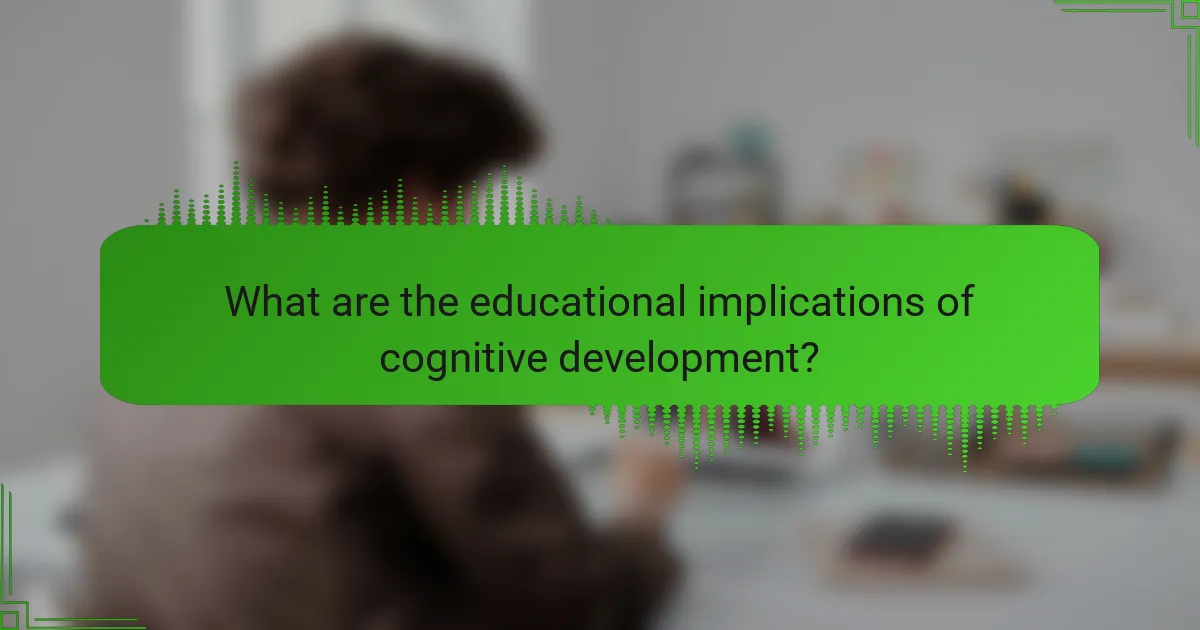
What are the educational implications of cognitive development?
Cognitive development significantly influences educational practices and strategies. It determines how children learn, process information, and solve problems. Understanding cognitive stages helps educators tailor their teaching methods. For example, Piaget’s theory outlines stages like sensorimotor and concrete operational, guiding age-appropriate learning activities. Research indicates that children learn best when instruction aligns with their cognitive abilities. Differentiated instruction can enhance engagement and understanding. Additionally, fostering critical thinking skills is essential for cognitive growth. Educators can implement inquiry-based learning to promote this. Overall, recognizing cognitive development’s role enhances educational outcomes.
How can educators support cognitive development in the classroom?
Educators can support cognitive development in the classroom by implementing strategies that promote critical thinking and problem-solving skills. They can encourage active learning through hands-on activities. Incorporating group discussions fosters collaboration and diverse perspectives. Providing feedback helps students understand their progress and areas for improvement. Using varied teaching methods addresses different learning styles. Establishing a positive classroom environment enhances student engagement. Research indicates that interactive learning increases retention and understanding. Studies show that cognitive development is linked to social interactions and supportive relationships in educational settings.
What teaching strategies promote cognitive growth?
Active learning strategies promote cognitive growth. These strategies engage students in the learning process. Techniques such as problem-based learning encourage critical thinking. Collaborative learning fosters communication and teamwork skills. Inquiry-based learning stimulates curiosity and exploration. Research shows that active engagement leads to better retention of information. A study by Freeman et al. (2014) found that active learning can increase student performance by 6% on average. These methods not only enhance understanding but also develop higher-order thinking skills.
How can curriculum be designed to enhance cognitive skills?
Curriculum can be designed to enhance cognitive skills by incorporating active learning strategies. Active learning engages students in the learning process through discussions, problem-solving, and collaborative work. Research shows that students who participate in active learning demonstrate higher retention of information. Additionally, integrating critical thinking exercises into the curriculum promotes analytical skills. This approach encourages students to evaluate information and make reasoned decisions. Furthermore, incorporating technology can facilitate interactive learning experiences. Tools like simulations and educational software can enhance engagement and understanding. Regular assessments can also help track cognitive development and inform instructional adjustments. Overall, a well-structured curriculum that emphasizes active participation and critical thinking effectively enhances cognitive skills.
What assessments can measure cognitive development in children?
Standardized tests can measure cognitive development in children. Common assessments include the Wechsler Intelligence Scale for Children (WISC) and the Stanford-Binet Intelligence Scales. These tests evaluate various cognitive abilities, such as reasoning, problem-solving, and memory. The WISC is designed for children aged 6 to 16 and assesses verbal and performance skills. The Stanford-Binet test is applicable for ages 2 to adulthood, measuring fluid reasoning and knowledge. Other assessments include the Kaufman Assessment Battery for Children (KABC) and the Developmental Assessment of Young Children (DAYC). The KABC focuses on processing abilities, while the DAYC assesses developmental milestones in young children. These tools provide insights into cognitive strengths and weaknesses.
What are the benefits of early cognitive assessments?
Early cognitive assessments provide crucial insights into a child’s developmental progress. They help identify potential learning disabilities or delays. Early detection allows for timely interventions and support. These assessments can guide tailored educational strategies. They also inform parents and educators about a child’s strengths and weaknesses. Research indicates that early assessments can improve long-term academic outcomes. According to the National Institute for Early Education Research, early intervention significantly enhances cognitive skills. This proactive approach fosters better emotional and social development as well.
How can assessment results inform educational practices?
Assessment results can inform educational practices by providing insights into student learning and areas needing improvement. These results help educators identify strengths and weaknesses in student performance. They allow for targeted interventions tailored to individual learning needs. For instance, formative assessments can guide instructional adjustments in real-time. Summative assessments can evaluate overall effectiveness of teaching strategies. Research shows that data-driven decisions enhance student outcomes. According to the National Center for Education Statistics, schools using assessment data effectively see improved academic performance. Thus, assessment results are crucial for shaping effective educational practices.
What are some practical tips for parents to support cognitive development?
Engaging children in interactive activities supports cognitive development. Parents can read together daily to enhance language skills. Playing puzzles fosters problem-solving abilities. Encouraging open-ended questions stimulates critical thinking. Providing age-appropriate toys promotes exploration and creativity. Establishing routines helps children understand sequences and time. Limiting screen time encourages more hands-on learning experiences. Lastly, social interactions with peers enhance communication and social skills.
Cognitive development in children encompasses the processes through which they acquire thinking, reasoning, and problem-solving skills, progressing through key stages identified by theorists such as Jean Piaget. The article outlines the four stages of cognitive development—sensorimotor, preoperational, concrete operational, and formal operational—highlighting their characteristics and implications for learning. It also examines the factors influencing cognitive growth, including genetics, environment, and nutrition, and discusses the educational implications of understanding cognitive development, including strategies for educators to support cognitive skills in the classroom. Additionally, the article addresses the importance of early cognitive assessments for identifying learning needs and guiding educational practices.
